By Lucy Komisar
Dec 16, 2019
I talked today on Fault Lines about the illicit Russian stock buys and tax evasion of the Ziff Brothers, whose Russian investments were handled by William Browder.
The following expands on and explains what I said in the half-hour broadcast.
In 2000, the Ziff Brothers, New York billionaires Robert, Dirk and Daniel, became major investors in William Browder’s Hermitage Fund.
The Ziffs occupy the 118-120th place in the ranking of the richest Americans by Forbes magazine, give or take a few digits as the list changes. Their total wealth is estimated at $14.4 billion. They got their money the easy way, they inherited it.
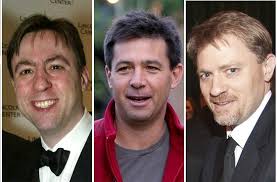
Their father William Bernard Ziff Jr. created Ziff Davis Media. It was once famous for publishing comic books and magazines such as Popular Aviation and Car and Driver. It owned TV stations and now owns PC Magazine, digital media and other products, reaching 117 million people in 100 countries.
BUYING GAZPROM
In 1994, with the family cash, the brothers formed Ziff Brothers Investments. When they became a Browder client, the Ziffs were interested in buying shares of Gazprom, the major Russian energy company.
Browder‘s accounting firm, Firestone Duncan, helped him evade the rules for Hermitage and the Ziffs. Konstantin Ponomarev, a founder of Firestone Duncan, told me that in 1996, “The firm developed for him a strategy of how to buy Gazprom shares in the local market, which was restricted for foreign investors.”
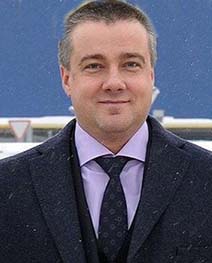
However, Gazprom’s charter and a 1997 presidential decree banned direct purchases by foreigners, including foreign companies and investment funds. The government saw the company as strategic and wanted some control over its ownership. Foreigners could buy those shares only through ADRs (American Depository Receipts) in London, but they could not buy them in such numbers and at the same price as Russians could.
He explained that, “If a foreign company or foreign-owned Russian company managed to buy shares of Gazprom in Russia, they could not register this deal properly and get title to the shares. Local prices were several times lower than prices for the same shares if you wanted to buy them outside Russian.”
He said, “To avoid this ban, Firestone Duncan registered over 30 Russian companies, some of which were owned by myself or other FD partners. All companies owned and controlled each other. Hermitage sent its investors’ funds to these companies as loans, then the companies would give these loans to each other. As a result, when any of these companies would buy Gazprom shares, for everyone it was a Russian-owned company with cash loaned from another Russian company.”
Ponomarev said it was clear the structure was illegal but “the price difference was so big (several times) and the risk was so low, they could not stop.”
ZIFFS OFFSHORE
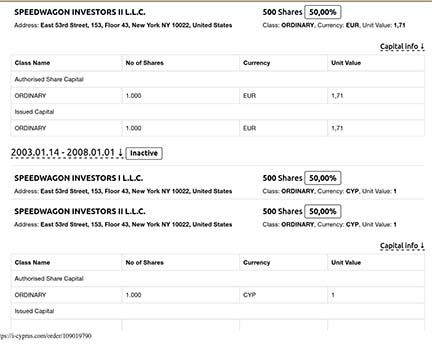
The Ziffs set up an offshore structure to hide the illicit deals.
First, Daniel Ziff, established two U.S. companies Speedwagon I and II, registered in New York and Delaware. Those company filings with the New York State Division of Corporations are signed by David Bardeen, Ziff Brothers Investments counsel.
The Speedwagons then set up Cyprus shell companies, including Zhoda, Giggs Enterprises and Peninsular Heights. The Cypriot data base of registered companies lists Giggs, with officers David Gray, partner and chief legal officer Ziff investments, Ian McKinnon, a longtime Ziff portfolio manager, now retired, and Mark Beaudoin of Ziff Capital Partners. Browder is listed on the Zhoda and Giggs filings, showing he played a role.
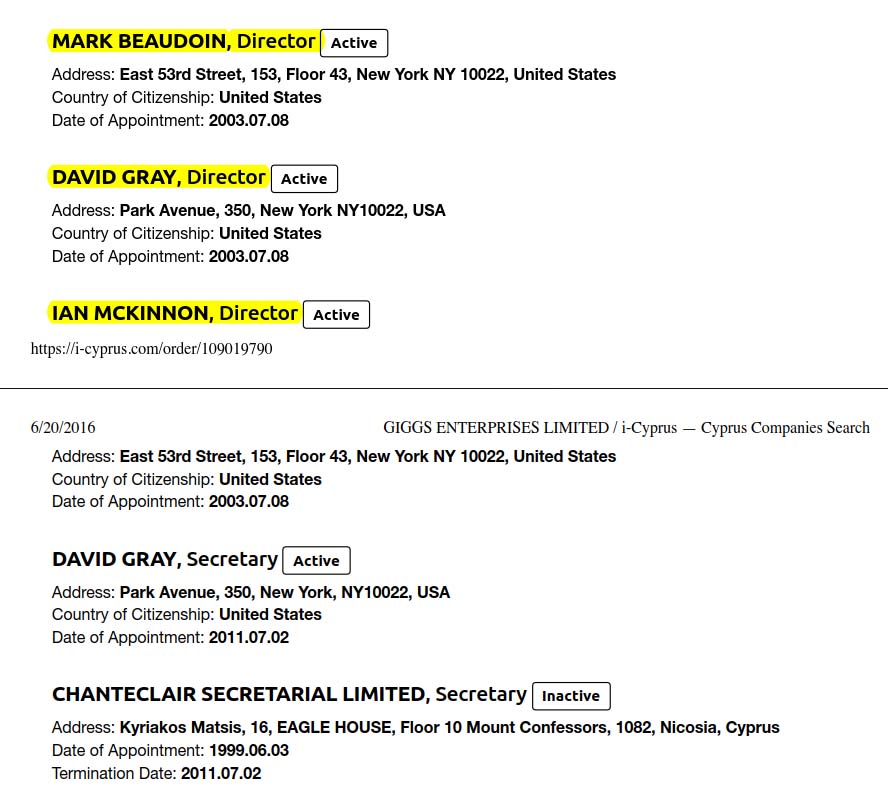
Then the Cyprus shells created another layer of front companies in Russia‘s Kalmykia region. Kameya and its trading activities were managed by the Hermitage Fund and its directors, including Browder and his partner Ivan Cherkasov. The Ziffs also had shells Kameya, Baikal-M, Sterling Investments, Lori, Empire and Excalibur.
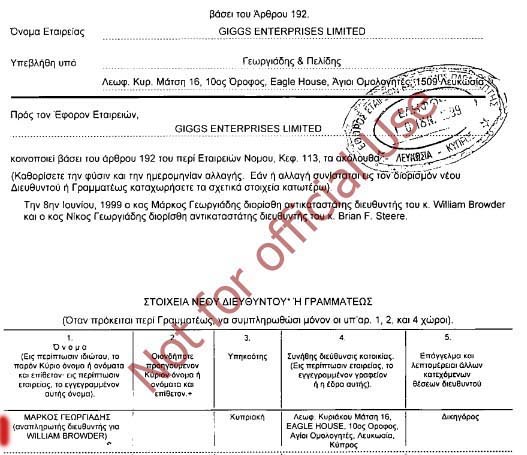
The Ziffs bought shares Gazprom on the St. Petersburg and Moscow brokerage trading floors in violation of the Russian presidential decree On the procedure for the circulation of shares in RAO Gazprom. The overall management of the process was carried out by Hermitage.
In 2006, the shares were transferred to the Cyprus company Giggs International and the cash received under the guise of dividends. The money and shares went to the U.S. companies managed by the Ziff Brothers Fund.
Attorney Natalia Veselnitskaya explained how that worked in a document provided to the U.S. Judiciary Committee in 2017.
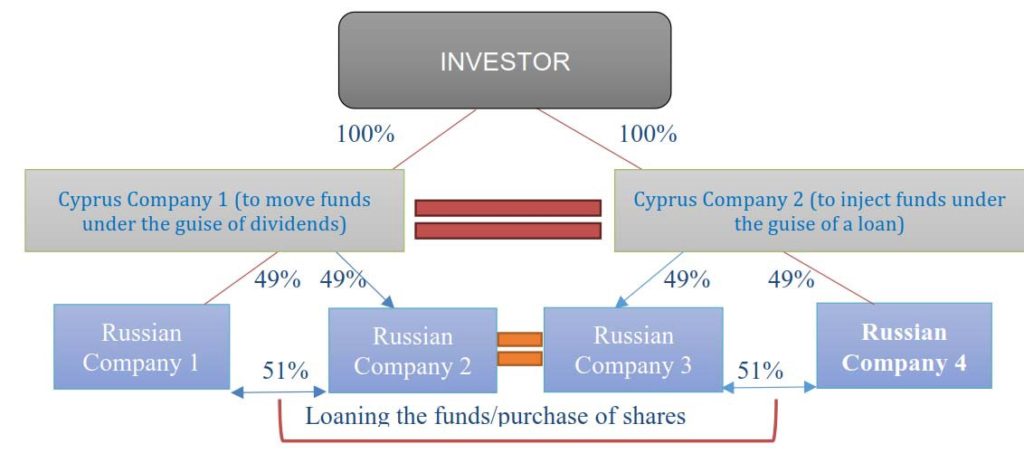
RUSSIAN AUTHORITIES FIND OUT
The Russian Ministry of Internal Affairs investigated suspected Hermitage illegal acquisition of Gazprom shares no less than 200 million shares of Gazprom from 1997 to 2005 as well as tax evasion and deliberate bankruptcy of several companies to cover up the scam.
The investigators saw Dirk, Robert and Daniel Ziff of Ziff Brothers Investments as Browder‘s accomplices.
In 2006, according to the Interior Ministry, the shares were consolidated in the shell company Kameya. The company sold some of them and the dividends passed the Cyprus offshores to Speedwagon Investors 1 and 2.
Russian investigators in April 2007 said that Kameya violated the law banning foreign companies from owning shares in Gazprom. Kameya was 49% owned by Zhoda, a Cypriot entity, and 51% by Baikal M, a Russian entity. [Both owned by the Ziffs.] Zhoda had a 49% interest in Baikal M, and the other 51% was held by Kameya. The roundabout structure didn‘t hide the fact that Kameya was effectively owned by a foreign company, Zhoda, and purchases of shares in Gazprom were in violation of the law, according to a report April 10, 2007 by Interior Ministry officer Artem Kuznetsov.
TAX EVASION
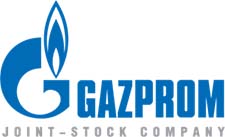
The Moscow Police Department said that the company had paid only 5% tax on the proceeds of the sale of Gazprom shares, rather than the 15% it should have paid, according to a report May 8, 2007 by police inspector and auditor Yuri Malofeev.
The tax crimes department of the Moscow Interior Ministry that month opened a criminal case against Cherkasov, accusing him of underpaying $44 million in dividend withholding taxes for Kameya. It said the company had wrongfully used a Russo-Cypriot tax treaty to reduce its tax payments.
The shares not bought by the Ziffs’ companies had been purchased and registered by Browder‘s Kalmykia companies Dalnaya Steppe, Saturn Investment and Ryland. Subsequently, the securities were also transferred to the Cypriot offshore companies to be sent to HSBC, trustee of Hermitage.
Browder claimed the Russian shell companies had paid the required 5%. Except the required rate was 15%. He wrote in his fictional book “Red Notice” that, “Kameya had paid the same rate of tax as everyone else.” And that Magnitsky had examined the tax filings and found nothing wrong. He added that Firestone Duncan sent a letter to the Moscow tax office where Kameya had submitted its returns, asking if the company owed any taxes. He says Magnitsky told him the response was that Kameya had overpaid its taxes by $140,000. That audits from the tax authorities showed the payments were correct. (Red Notice p210)
ALL UNTRUE
That was a deceptive answer. The tax office ruling was based on papers Hermitage filed, not on an investigation into whether the filing was truthful. Corporate tax was paid, but then profit was paid as dividends to shareholders. And such transactions are taxable in Russia. The dispute is whether the dividend tax should be 5% for Cypriot investors according to a Russia-Cyprus treaty, as Browder asserted, or 15% if the treaty benefit could not be used.
So, if Kameya declared itself exempt from taxes under the treaty, and submitted information to back up that claim, the tax office would likely calculate the tax on that basis. The investigators, however, looked at evidence.
According to the treaty, the companies in Russia and Cyprus had to be engaged in “economic cooperation.” But this was just a single company with a complex ownership structure. And the Cypriot company was just a shell not really managed from Cyprus. In that case, for all Firestone Duncan‘s legerdemain, the lower tax rate didn‘t apply.
On May 19, 2016 Russia‘s general prosecutor returned to the matter. The investigation focused on the illegal acquisition of at least 200 million shares of Gazprom, of tax evasion and the deliberate bankruptcy of a number of companies between 1997 and 2005.
His office had found Browder‘s Hermitage Fund and his investors, including the Ziff Brothers, had evaded more than 1 billion rubles ($16 million) in Russian taxes, including transferring profits to Ziff-controlled companies overseas.
U.S. LEGAL ASSISTANCE REQUESTED
Ziff Brothers Investments is a US tax resident. The prosecutor suspected the transactions also may have violated U.S. law law on investment activity, and could be a reason for criminal prosecution by U.S. authorities.
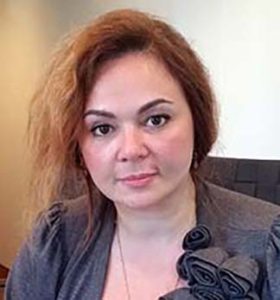
According to lawyer Natalia Veselnitskaya, violations included the fact that Ziff Brothers Investments was not registered with the U.S. Securities and Exchange Commission as an investment company, and therefore it could not participate in such transactions. Veselnitskaya repeated those allegations in comments to the Russian press about the Magnitsky case at the time.
The prosecutor appealed to the United States for international legal assistance requesting that the U.S. verify these transactions for compliance with U.S. financial and tax legislation and provide the necessary information on the scheme for the withdrawal of Russian assets to complete the investigation in Russia and transfer the case to court.
On June 4, 2017, Russian general prosecutor Yuri Chaika said on national television that his agency “has presented serious evidence of violations of the law by Browder and the Ziff brothers” to U.S. officials. There was no indication of any U.S. response to that claim.
INFO GIVEN TO TRUMP JR
The documents Russian lawyer Nataliya Veselnitskaya offered to Donald Trump Jr. were about tax evasion by the Ziff Brothers, who had donated to the Clinton Foundation. The Ziffs gave heavily to both Democrats and Republicans.
The Ziffs would later become part of Och-Ziff, a client of Jay Clayton, chair of the Securities and Exchange Commission.
The Ziffs are no longer investors in Russia, but are involved in other deals through their partnership in Och-Ziff Capital Management, the largest U.S. publicly traded hedge fund.
CHARGED WITH CORRUPTION BY U.S. AUTHORITIES
The Och-Ziff fund settled in September 2016 with the U.S. Justice Department and the Securities and Exchange Commission for $412 million for having paid bribes to foreign officials to win mining rights in Chad, Niger, Guinea, and the Democratic Republic of the Congo and to the son of Libyan Colonel Gaddafi and others to win at least $300 million in investments from the Libyan Investment Authority’s sovereign wealth fund. The fund thereby purchased a deferred prosecution agreement to avoid criminal and civil charges.
Two Och-Ziff executives, including founder and CEO Daniel Och, settled charges by the SEC that they violated the FCPA. Daniel Och agreed to pay nearly $2.2 million to resolve the SEC action. They did not admit or deny the charges.


Pingback: John Bolton shows his ignorance by repeating Browder-Magnitsky hoax – The Komisar Scoop
author is a russian spy.
she confuses cause/effect and to some extent the intent of tax laws even in a country as corrupt as russia.
lastly there is no mention of the assessment and i dont have any idea where she is going to at the end.
its likely a racist attempt by a neo nazi to accuse american jews of ripping uncle vlad?
LK: Tax laws say you can’t take fake deductions, as Wm Browder did, claiming manual laborers as stock analysts. And by the numbers, the US is massively more corrupt than Russie.
The assessment was about $100 million, part for evaded taxes, part for illicitly bought Gazprom shares.
American Jews didn’t rip off Russia, just, in this case, Wm Browder, who gave up his American passport for a British one to avoid paying taxes on offshore income. Shouting anti-Semitism does not protect Jews who happen to be crooks.